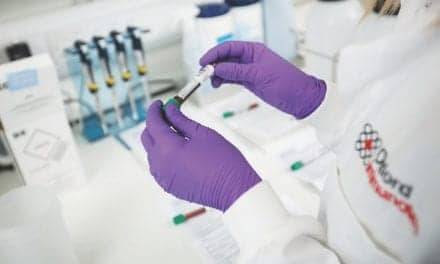Cepheid announced that its Xpert® MTB/RIF test was the subject of a study published in the latest edition of the New England Journal of Medicine (NEJM), "Rapid Molecular Detection of Tuberculosis and Rifampin Resistance." The study compared the sensitivity and specificity of Xpert MTB/RIF to the best available reference standards in the diagnosis of 1,730 patients with suspected drug-sensitive or multi drug-resistant pulmonary tuberculosis (TB) at five centers in Peru, Azerbaijan, South Africa, and India. The study concluded that Cepheid’s Xpert MTB/RIF – an easy-to-use molecular test developed in partnership with FIND and the University of Medicine and Dentistry of New Jersey (UMDNJ), with additional funding from the National Institute of Allergy & Infectious Diseases (NIAID) – provided sensitive and specific detection of tuberculosis and rifampin resistance (a critical marker of multidrug resistance) directly from untreated sputum specimens in less than two hours.
Designed for use on Cepheid’s GeneXpert® Systems, Xpert MTB/RIF not only detects the presence of TB, but also identifies whether it is resistant to rifampin, a critical first-line drug for treatment of the disease and a reliable surrogate marker of strains that are multidrug-resistant (MDR-TB). The CE-IVD test is enabling physicians outside of the U.S. to dramatically improve patient outcomes through rapid, actionable results that guide therapy decisions within the timeframe of an initial patient visit.
"The need for accurate and rapid detection of tuberculosis for the growing at-risk populations in the developing world has been well documented," said John Bishop, Cepheid’s chief executive officer. "The GeneXpert System has a unique level of technical capability – no other molecular system could have enabled a TB test as accurate, fast, and easy-to-use as Xpert MTB/RIF. Clinicians are now able to obtain dependable test results for not only detection of TB, but also simultaneous determination of whether or not it is a drug resistant strain in virtually any clinical setting."
Rapid diagnosis of TB is vital in areas such as sub-Saharan Africa and Southeast Asia due to the close connection between HIV and TB. The most commonly used diagnostic tool in many settings is still sputum microscopy, which often delivers poor sensitivity in patients suffering from TB, delaying accurate diagnosis and treatment until culture and sensitivity testing are completed weeks later. In fact, sputum microscopy has very poor sensitivity in those who also have HIV co-infection. The weakened immune system of an HIV-positive person is particularly susceptible to infection, resulting in one third of the 33 million HIV sufferers worldwide infected with TB. Left undetected and untreated, 90 percent of these people will die within months of first contracting the disease, reinforcing the urgent need for a solution.
The NEJM study found that with a single, untreated sample Xpert MTB/RIF was 98.2 percent sensitive in patients with smear-positive (test by sputum microscopy), culture-positive TB, 99.2 percent specific in patients without TB, and 97.6 percent sensitive in patients with rifampin resistance. Further, when testing smear-negative, culture-positive samples, Xpert MTB/RIF was 90.2 percent sensitive when compared to the standard analysis of three sputum samples by microscopy and was 72.5 percent positive on a single sample.
"We designed this test so that it could be used by someone with minimal training," said UMDNJ’s David Alland, M.D, who collaborated closely with Cepheid and FIND with support from the NIAID. "We’re gratified to find that it requires less hands-on work than the acid fast smear, long considered the standard method to identify TB, and yet is much more sensitive." Xpert MTB/RIF is currently available outside the U.S., marketed as a CE IVD product under the European Directive on In Vitro Diagnostic Medical Devices. It is currently expected to become available in the U.S. within the 2012-2013 timeframe.
Source: Cepheid, Inc.




